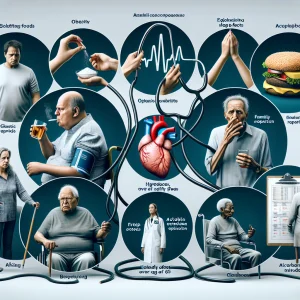Understanding High Blood Pressure: The Silent Killer’s Impact on Your Health
High blood pressure, also known as hypertension, is a widespread health condition that affects millions of adults globally. Many people may not realize they have high blood pressure because its symptoms are often subtle or entirely absent. This hidden nature of hypertension makes it particularly dangerous, as untreated cases can lead to severe health complications, including heart disease and stroke. Regular blood pressure screenings are essential for early detection and effective management, ensuring that your levels remain within a healthy range and mitigating the risks associated with this silent condition.
Implementing small yet impactful lifestyle changes can significantly assist in managing your blood pressure effectively. Simple choices like embracing a nutritious diet loaded with fruits, vegetables, and whole grains play a pivotal role in maintaining healthy blood pressure levels. Additionally, prioritizing restful sleep and stress-reduction techniques can further promote cardiovascular health and overall well-being. By making these adjustments, you not only improve your heart health but also enhance your quality of life.
 Measuring Blood Pressure: Importance and How It Affects Your Health
Measuring Blood Pressure: Importance and How It Affects Your Health
Blood pressure refers to the force that circulating blood exerts against the walls of your blood vessels. This critical measurement is influenced by the heart’s pumping action and reflects how efficiently blood is distributed throughout your body. Maintaining a normal blood pressure is vital for overall health, as elevated levels can have serious repercussions, including the risk of heart attack and stroke. Regular monitoring of your blood pressure can help catch any concerning changes early, allowing for timely intervention.
Blood pressure is expressed in millimeters of mercury (mmHg) and consists of two primary values:
- Systolic Pressure – This is the first, higher value that measures the pressure in your arteries when the heart beats and pumps blood.
- Diastolic Pressure – This is the second, lower value that indicates the pressure in your arteries when the heart is at rest between beats.
For example, a reading of 120/80 mmHg indicates a systolic pressure of 120 and a diastolic pressure of 80, which is typically considered within the normal range.
Understanding the Causes and Risks Associated with High Blood Pressure
High blood pressure can stem from various factors, often linked to narrowing arteries that increase resistance to blood flow. This increased resistance can elevate blood pressure levels, leading to significant strain on essential organs such as the kidneys, heart, brain, and eyes. Over time, untreated hypertension can result in severe health complications, particularly those related to cardiovascular disease, which can substantially impact overall health and longevity.
While blood pressure can fluctuate for numerous reasons, healthcare professionals classify readings based on established criteria:
Low blood pressure – 90/60 mmHg or below
Normal blood pressure – Ranges from 90/60 mmHg to 120/80 mmHg
High blood pressure – 140/90 mmHg or higher
A reading between 120/80 mmHg and 140/90 mmHg signals an increased risk of developing hypertension in the future. However, it’s crucial to acknowledge that individual blood pressure norms can differ, making it essential to consult with your healthcare provider to understand your specific situation and limits.
 Exploring the Key Risk Factors for High Blood Pressure Development
Exploring the Key Risk Factors for High Blood Pressure Development
While there isn’t a singular cause of high blood pressure, various risk factors can contribute to its increase. Some of the main contributors include:
- Being overweight or obese
- Smoking
- High-sodium diet
- Family history of hypertension
- Excessive alcohol consumption
- Lack of adequate sleep
- Insufficient physical activity
- Aging, especially beyond 65 years
- Ethnic background, particularly Caribbean or African descent
Many of these risk factors can be modified through conscious lifestyle changes. In rare cases, high blood pressure may arise from specific medical conditions or medications, affecting approximately 1 in 20 individuals. These underlying conditions may include:
- Thyroid disorders
- Kidney diseases
- Diabetes
- Use of steroids
- Hormonal contraceptives
- Recreational drug use, such as cocaine
Unveiling the Hidden Symptoms of High Blood Pressure
One of the significant challenges with hypertension is its tendency to present with no clear symptoms, causing many individuals to remain unaware of its presence. In the UK alone, it is estimated that nearly 25% of adults live with undiagnosed high blood pressure. The only reliable method to assess your blood pressure status is through regular testing, which can help detect any issues early and facilitate appropriate management.
You can have your blood pressure checked at various locations, including:
- Your doctor’s office or with a healthcare professional—just request a blood pressure check during your visit.
- Many local pharmacies offer blood pressure monitoring services.
- Some workplaces may have health screenings available for employees.
- At home, you can use a personal blood pressure monitor for regular checks.
 Proven Strategies for Effectively Lowering Your Blood Pressure
Proven Strategies for Effectively Lowering Your Blood Pressure
Since lifestyle choices significantly influence high blood pressure, implementing strategic changes can help lower your risk. Here are four essential strategies to consider:
Incorporate Regular Physical Activity
Making physical activity a regular part of your routine is essential for maintaining a healthy heart and blood vessels, which in turn can help reduce blood pressure levels. Excess weight can put undue strain on your heart, making it work harder to pump blood efficiently. By engaging in consistent exercise, you can shed excess pounds and enhance your cardiovascular fitness, both of which are crucial for lowering blood pressure effectively.
Embrace a Heart-Healthy Diet
Adopting a well-balanced diet that prioritizes whole foods—such as fruits, vegetables, and lean proteins—can significantly aid in lowering blood pressure. Since high sodium intake is known to elevate blood pressure, it’s vital to limit salt consumption. The NHS recommends keeping your salt intake below 6g per day, roughly equivalent to one teaspoon. Consider reducing your intake of processed foods that are high in salt and using herbs and spices as healthier alternatives for flavoring your meals.
Moderate Alcohol Consumption
Reducing both the amount and frequency of alcohol consumption can have a positive impact on managing your blood pressure levels. Incorporating alcohol-free days into your weekly routine and spacing out your drinking days can be beneficial. Although the NHS suggests a maximum of 14 units of alcohol per week—approximately equal to 7 pints of 4% ABV beer or 7 glasses of 175ml wine—it’s important to note that consistently reaching this limit is not necessary for everyone.
Prioritize Restorative Sleep
Chronic sleep deprivation can increase the likelihood of developing high blood pressure. The NHS advises aiming for 6 to 9 hours of restorative sleep each night to promote overall health and maintain healthy blood pressure levels. Establishing a calming bedtime routine and creating a sleep-conducive environment can significantly enhance your sleep quality, contributing to better blood pressure management.
Presented By: Private Blood Pressure Tests
The Article Blood Pressure Test Explained: What You Need to Know Was Found On https://limitsofstrategy.com




Your discussion on high blood pressure as a ‘silent killer’ truly resonates with me, particularly as someone who has witnessed the impact of hypertension on loved ones. This condition often feels like an insidious shadow lurking in the background, and its subtlety can lead many to underestimate its significance until it’s too late. It’s alarming how many people go about their day-to-day lives without realizing the seriousness of their untreated hypertension, only to face life-altering consequences later on.